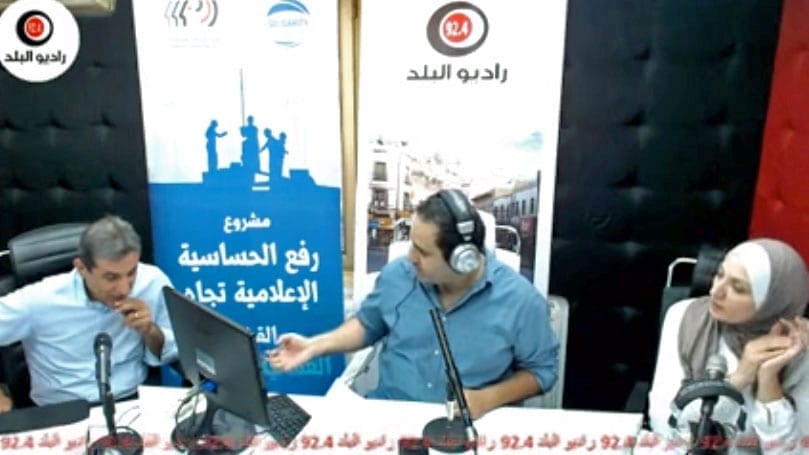
Sep 26, 2019
Callers to a recent radio show about taxi workers in Jordan had many questions, including:
- Why are taxi drivers classified as independent contractors rather than as employees who are eligible for better wages and benefits?
- Why do Jordan’s laws prohibit taxi drivers from joining the country’s transport workers union?
The worker-centered radio show, Workers of the Country (عمال البلد), launched in July by the Federation of Independent Trade Unions of Jordan (FITU), offers the audience an opportunity to hear worker struggles and connects workers with the union—several callers to the August program asked how they could join FITU.
Hosted by Mohammad Al Ersan, in cooperation with FITU President Suleiman Al Jamani, the show has featured union activists and experts on domestic worker rights, labor law and sexual harassment and gender-based violence at work. Peppered with clips from worker rallies and opportunities for the audience to engage with speakers, the show offers a rare look at the day-to-day lives of working people and their efforts to improve their lives and livelihoods.
The segment on taxi drivers highlighted the drivers’ challenges in making a living, a struggle they share with “gig workers” and those in the informal economy around the world. As “self-employed” workers, the nearly 70,000 taxi drivers are excluded from labor laws, and so have no contract, paid leave, retirement or other social protections, Al Seryani said on the show. To make enough to get by, they work long shifts, up to 18 hours per day, which endangers drivers and passengers, he said, and they have suffered for decades without fundamental labor rights.
A union member who called in reinforced Al Seryani, saying the union was established because of the oppression the drivers face, and Manasour Murad, a member of Parliament who also called in said the Ministry of Transport lacks the strategic planning necessary to provide efficient transportation services, including the ability to improve drivers’ working conditions.
Workers’ Struggles, Union Support
In bringing workers’ struggles to the forefront, the 50-minute program probes issues rarely highlighted in the mainstream media yet which are fundamental to the country’s economy and the working people who build it. Fundamental to the discussions are the ways in which unions enable workers to achieve a voice in improving their workplaces and standing up for their rights.
For instance, in exploring sexual harassment and other forms of gender-based violence (GBVH) at work during the show’s second segment, guests highlighted the role of unions in defending workers who experience GBVH on the job and how unions are a resource for assisting workers in reporting abuse while preventing retaliation for standing up for the right to a violence-free workplace. Wijdan Abu Ghanam, leader of the FITU women’s committee, Reema Khaled, an agriculture union activist, and Reem Aslan, a working women’s rights activist and founding member of the Association Sadaqa, a Jordanian women’s rights association, took part in the discussion.
In an another program, Salem Al Mefleh, a lawyer in Jordan, discussed migrant domestic worker rights and the difficulty in enforcing laws to protect them. The segment also featured Hayel Al Zenen, director of the country’s domestic worker directorate, and a domestic worker activist from Ethiopia who discussed how migrant domestic workers in Jordan often labor 24 hours with little food and no leave. Some employers refuse to let them leave the house and never even pay their wages, according to the activist, who asked to remain anonymous to protect her job.
With an estimated 440,000 to 540,000 migrant workers in a country with fewer than 10 million people, migrant workers are an essential part of the economy yet have few rights under labor laws, including the ability to form unions—a situation all-too often replicated across Gulf countries and around the world.
Meeting the Challenges of Restrictive New Labor Laws
The country’s newly amended labor code was the focus of an early segment and an issue discussed throughout the shows. Signed into law in May, the amendments restrict workers’ fundamental rights to freedom of association and collective bargaining and fail to address long-standing limitations on worker rights in Jordan, according to the International Trade Union Confederation (ITUC).
The labor law also now makes it easier for employers to arbitrarily fire workers, says attorney and women’s rights activist Hala Ahed, who joined Hamada Abu Nijmeh, director of the Worker Center, in a discussion on the new labor codes. Further, independent unions like FITU are now unable to register as unions under the labor law.
Despite the challenges, Al Seryani says that as an independent union, FITU has achieved significant victories for workers in improving wages and working conditions, a message the country’s new worker-centered radio program is conveying each week through the voices of workers themselves.
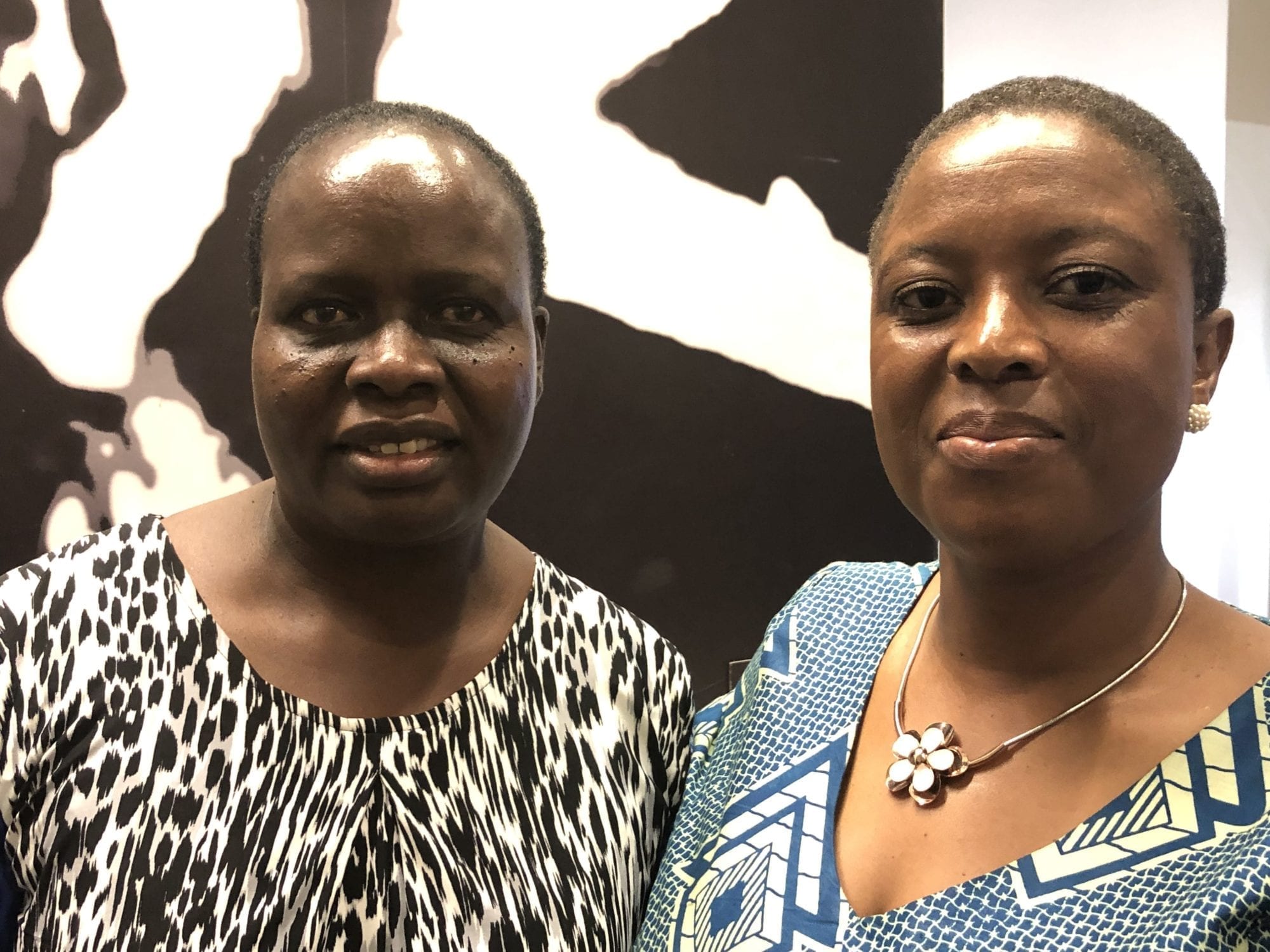
Sep 25, 2019
Dynamic women worker rights leaders from across the globe offered a vision for hope, resilience and movement toward an economy and society that works for people and the planet yesterday at the event, “Building Power: Women’s Leadership in the Fight for Justice, Democracy and Fair Work” in New York City.
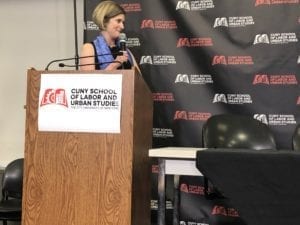
“Collective power is the way to build justice.”—AFL-CIO International Director Cathy Feingold. Credit: Solidarity Center/Tula Connell
“We are bringing women labor leaders together today who are at the forefront of movement building. They all know one thing—collective power is the way to build justice. Collective power is the way to democracy,” said AFL-CIO International Director Cathy Feingold, opening the gathering, a side event to the United Nations General Assembly meetings happening this month. (Watch the event here.)
Sponsored by the Open Society Foundations (OSF), Ford Foundation, Freedom Fund, Fundación Avina, C&A Foundation, Humanity United and AFL-CIO, Solidarity Center and Global Labor Justice, the gathering of representatives from the philanthropic community and worker justice organizations served to both celebrate the achievements of women leaders and reflect on what has worked—and what needs more support—in the fight for justice, democracy and fair work for all.
In a statement issued before the event, the philanthropies committed to supporting labor organizations and worker groups in their portfolios, backing ratification and implementation of International Labor Organization (ILO) Convention 190 to eliminate gender-based violence and harassment at work, and boost advocacy to support civic space.
The philanthropies were inspired by the women who fought for passage of Convention 190, said Laine Romero-Alston, team manager for the Fair Work Program/International Migration Initiative at OSF. “Out of that inspiration we are committing to you all to support the work moving forward.”
‘Dignity and Rights of Working People, Not Exploitation’
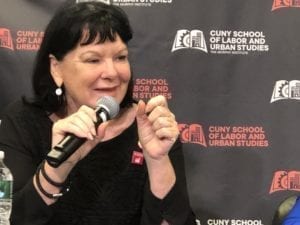
The future of work must be about “dignity and the rights of working people and not exploitation”—ITUC General Secretary Sharan Burrow. Credit: Solidarity Center/Tula Connell
Discussing a global movement for economic justice, democracy and fair work, women union leaders featured on the first of two panels agreed there is a worldwide jobs crisis—and women endure the lowest pay and worst working conditions.
“Look at the inequalities in workplaces, who is most affected? Women are most affected,” said Rose Omamo, general secretary of Amalgamated Union of Kenya Metal Workers and the national chair of the Central Organization of Trade Unions-Kenya (COTU-K) Women’s Committee.
“We need to work in solidarity together, have alliances, build alliances,” said Omamo who, as an elected member of the Organization of African Trade Union Unity and a member of ITUC–Africa Women’s Committee, is building cross-continent partnerships.
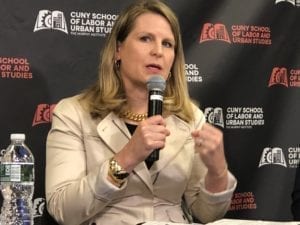
AFL-CIO Secretary-Treasurer Liz Shuler urges unions to reach out to young workers. Credit: Solidarity Center/Tula Connell
“Sixty percent of the world’s workers are in the informal economy with no minimum wage, no rule of law, no social protections,” International Trade Union Confederation (ITUC) General Secretary Sharan Burrow said to the packed crowd. “The employment model is broken down and the future of work must be about dignity and the rights of working people, not exploitation,” she said.
Moderated by Patrick Gaspard, OSF president and former U.S. ambassador to South Africa, the panel also explored solutions for ensuring a future of work rooted in a global economy that works for everyone.
One solution starts with unions themselves: “We need to get more women into union leadership,” said AFL-CIO Secretary-Treasurer Liz Shuler. “We cannot be afraid to fail and experiment and connect with young people by making the labor movement relevant to what they see in their lives.”
‘Elimination of Gender-Based Violence Key to Accessing Other Rights’
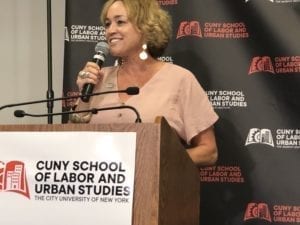
Solidarity Center Executive Director Shawna Bader-Blau: “Labor rights are core to all our democratic rights.” Credit: Solidarity Center/Tula Connell
Moderated by Solidarity Center Shawna Bader-Blau, the second panel included Libakiso Matlho, national director at Women and Law in Southern Africa Research and Education Trust–Lesotho (WLSA). Matlho discussed the recent landmark agreement agreement WLSA participated in negotiating that will address the rampant gender-based violence and harassment denying thousands of women garment workers a safe and dignified workplace in Lesotho.
Lesotho-based unions and women’s rights groups, major fashion brands and international worker rights organizations, including the Solidarity Center, negotiated the worker-centered program in August with factory owner Nien Hsing Textiles.
One element that sets the agreement apart from most corporate social responsibility (CSR) initiatives, she said, is the inclusion of freedom of association. With unions at the table, she said, employers can be held accountable to keeping their commitments.
Worker rights leaders Maricarmen Molina and Anannya Bhattacharjee discussed the structural underpinnings of gender-based violence at work and the ramifications for women workers who suffer such abuse.
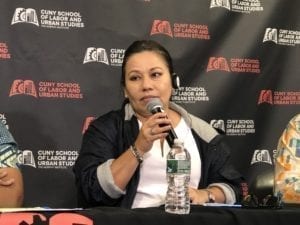
“Violence and harassment are part of a continuum of behaviors in many of the systems where we work”—Mariecaremen Molina Credit: Solidarity Center/Tula Connell
“Violence and harassment are part of a continuum of behaviors in many of the systems where we work,” said Molina, the first woman secretary general of a national union confederation in Central America, the CSTS (Confederación Sindical de Trabajadores y Trabajadoras de El Salvador). The CSTS, working with the national federations CONFUERSA and FEASIES, recently won significant minimum wage increases for workers in service, industrial and agricultural sectors.
“We have found that gender-based violence at the workplace is the most corrosive element that works against everything,” said Bhattacharjee, international coordinator for the Asia Floor Wage Alliance.
“It is really difficult for women in those situations to attempt to form unions,” which would enable them to join together to improve their working conditions.
With Global Labor Justice, Asia Floor Wage Alliance this year launched a global campaign, #GarmentMeToo, a movement led by women union leaders to contribute to new international labor standards.
Elimination of gender-based violence is the necessary condition for accessing other labor rights, such as the right to a living wage, such as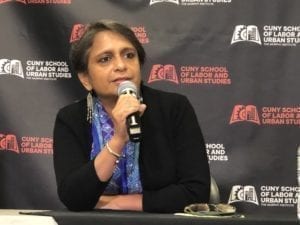 the right to freedom of association,” said Bhattacharjee. “It is part of a global supply chain where the brands are the main drivers. Their purchasing practices are what causes the gender-based violence. Anything we do, they have to build held accountable in any agreement that works.”
the right to freedom of association,” said Bhattacharjee. “It is part of a global supply chain where the brands are the main drivers. Their purchasing practices are what causes the gender-based violence. Anything we do, they have to build held accountable in any agreement that works.”
Unions and collective action are key to holding employers accountable and to ensuring workers can exercise their fundamental rights on the job, the panelists agreed. And “labor rights are core to democracies, they are core to making all our other democratic rights real,” said Bader-Blau, closing the event. “These rights are under attack in every single one of our countries right now. And it is on all of us to stand up for worker rights.
“For every woman trade unionist who has ever received a death threat for daring to lead… for every new activist young and old entering the labor movement right now who doesn’t know if she has a place because our institutions have for so long been so male dominated, we see you,” she said.
“We respect and honor what you are trying to do to make our democracies stronger and more just. You are the future and we all of us in this room have your back because this is what democracy looks like!”
The CUNY School of Labor and Urban Studies hosted the event, with Dean Gregory Mantsios welcoming the group.
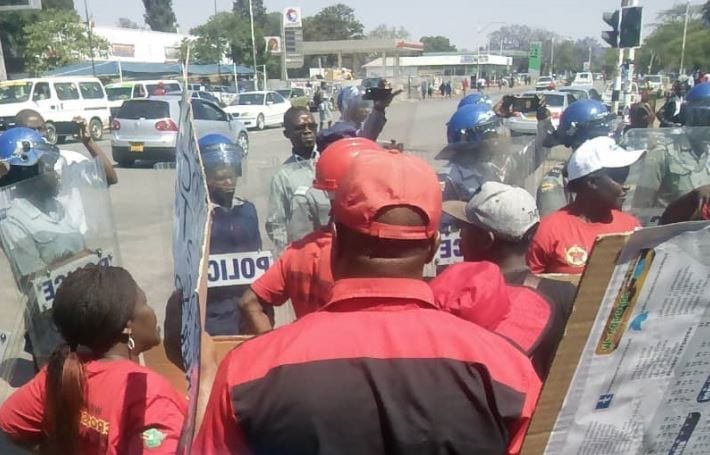
Sep 18, 2019
Doctors in Harare are protesting the abduction and disappearance of the acting president of the Zimbabwean Hospital Doctors Association (ZHDA), Peter Magombeyi. His disappearance is part of a pattern of violence against civil society defenders in the country, according to the Zimbabwe Congress of Trade Unions (ZCTU) and other rights groups.
More than 50 trade union leaders and opposition activists have been abducted in the middle of the night, many of them tortured, in Zimbabwe since January of this year, according to rights groups.
The death threats Magombeyi received before his disappearance closely parallel those targeting ZCTU President Peter Mutasa and Secretary General Japhet Moyo.
“What is frightening to some of us,” says Moyo, “[is that] the network cell phone numbers used are the same as those that were used in sending threats to myself previously.”
An attempted fact-finding visit by a delegation of the International Trade Union Confederation (ITUC) in February this year resulted in denial of visas for most of the delegation and the arrest of ITUC-Africa Secretary General Kwasi Adu Amankwah by state security. The United Nations’ Special Rapporteur on the right to peaceful assembly and association, Clément Nyaletsossi Voule, yesterday began a 10-day visit to assess Zimbabwe’s performance regarding respect of citizens’ right to freedom of peaceful assembly and of association.
Ongoing death threats and a sustained government crackdown have forced Moyo and Mutasa into hiding, impeding ZCTU’s ability to effectively represent its members and ensure workers’ right to freedom of association. Citing failure to act, the ZCTU last month petitioned Zimbabwe police to investigate and bring to justice individuals who continue to threaten its leaders. Meanwhile, the Zimbabwe Republic Police (ZRP) dismissed reports of kidnappings Tuesday as “alleged abductions as a means to tarnish Zimbabwe’s image and compromise its security.”
Meanwhile, Zimbabwe’s economy flounders and inflation and price hikes complicate Zimbabwean workers’ already difficult lives.
In the aftermath of a civil society protest against rising prices and a financial tax increase in October last year, some trade unionists were beaten; Mutasa, Moyo and 33 other trade unionists were arrested; senior ZCTU leaders were forced into hiding; and ZCTU Harare offices were cordoned off by some 150 police. After ZCTU helped organize a national strike in January this year to again protest price hikes, violent clashes resulted in 12 deaths and 320 injuries, blamed by human rights organizations on the army and police. Police seeking Mutasa after the protests allegedly assaulted his brother at his home and intimidated ZCTU staff. Arrested and charged with subversion for their role in the January protests, Mutasa and Moyo were left in legal limbo for months, after the Zimbabwe government repeatedly postponed their trials.
The majority of Zimbabwean workers eke out a living in the informal economy, struggling to survive on less than $1 a day. Those with formal jobs often do not fare well either. A 2016 study by the Solidarity Center found that 80,000 workers in formal jobs did not receive wages or benefits on time, if at all. In many cases, they made only enough to get to work.
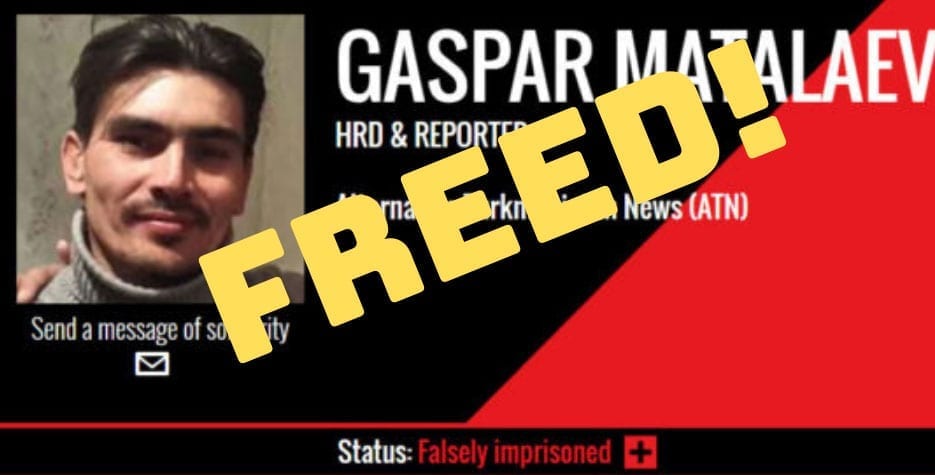
Sep 6, 2019
Gaspar Matalaev, a labor and human rights activist who monitored and reported on the systematic use of forced adult labor and child labor in Turkmenistan’s cotton fields, was released today after serving three years in prison on spurious charges stemming from his reporting.
Matalaev was arrested in October 2016, two days after Turkmen.news published his extensive report on state-sponsored forced labor.
He reportedly was tortured and held incommunicado while in prison, according to the Cotton Campaign, a coalition of organizations, including the Solidarity Center, working to end state-organized forced labor in Central Asian cotton fields.
The global labor and human rights communities are hailing the release, but are united in insisting Matalaev should never have been imprisoned.
“Today is not a victory for justice. Matalaev should never have spent the past three years behind bars,” according to the Cotton Campaign. “We will continue to support activists who expose the injustice of forced labor and modern slavery with the support of our global community.”
The international community rallied in support of Matalaev, with more than 100,000 people signing an online petition to the Turkmen government demanding his immediate release. Activists also picketed the Turkmen Embassy in Washington, D.C. In May 2019, the International Labor Rights Forum awarded Gaspar Matalaev the Defender of Labor Rights Award for making public the Turkmenistan government’s ongoing use of forced labor during the annual cotton harvest.
Some 70 companies, including Levi Strauss & Co and H&M, have signed the Turkmen Cotton Pledge, refusing to supply cotton from Turkmenistan as long as it is produced in a system that relies on forced labor. Additionally, 84 investors of these companies with assets of nearly $860 billion have signed a related investor statement that notes the importance of preventing the presence of Turkmen cotton in companies’ supply chains until the government ends its coercive system.
Turkmenistan: One of the World’s Worst Human Trafficking Records
Turkmenistan has one of the worst human trafficking records in the world, according to the U.S. State Department’s 2019 Trafficking in Persons Report. In 2018, the report found that even as the Turkmen government “continued to engage in large-scale mobilizations of its adult citizens for forced labor in the annual cotton harvest and in public works projects, no officials were held accountable for their role or direct complicity in trafficking crimes.”
Human trafficking within countries of citizenship is especially prevalent in cases of labor trafficking, such as in Turkmenistan.
The Turkmen government “tightly controls all aspects of public life and systematically denies freedoms of association, expression and religion,” according to Human Rights Watch.
In April 2018, the United Nations Working Group on Arbitrary Detention said Matalaev was “subjected to arbitrary deprivation of liberty based on trumped-up charges” and his detention was “a direct result of his exercise of the freedom of expression and opinion.” The working group recommended Turkmen officials release Matalaev and compensate him, but the government ignored all calls for his early release.
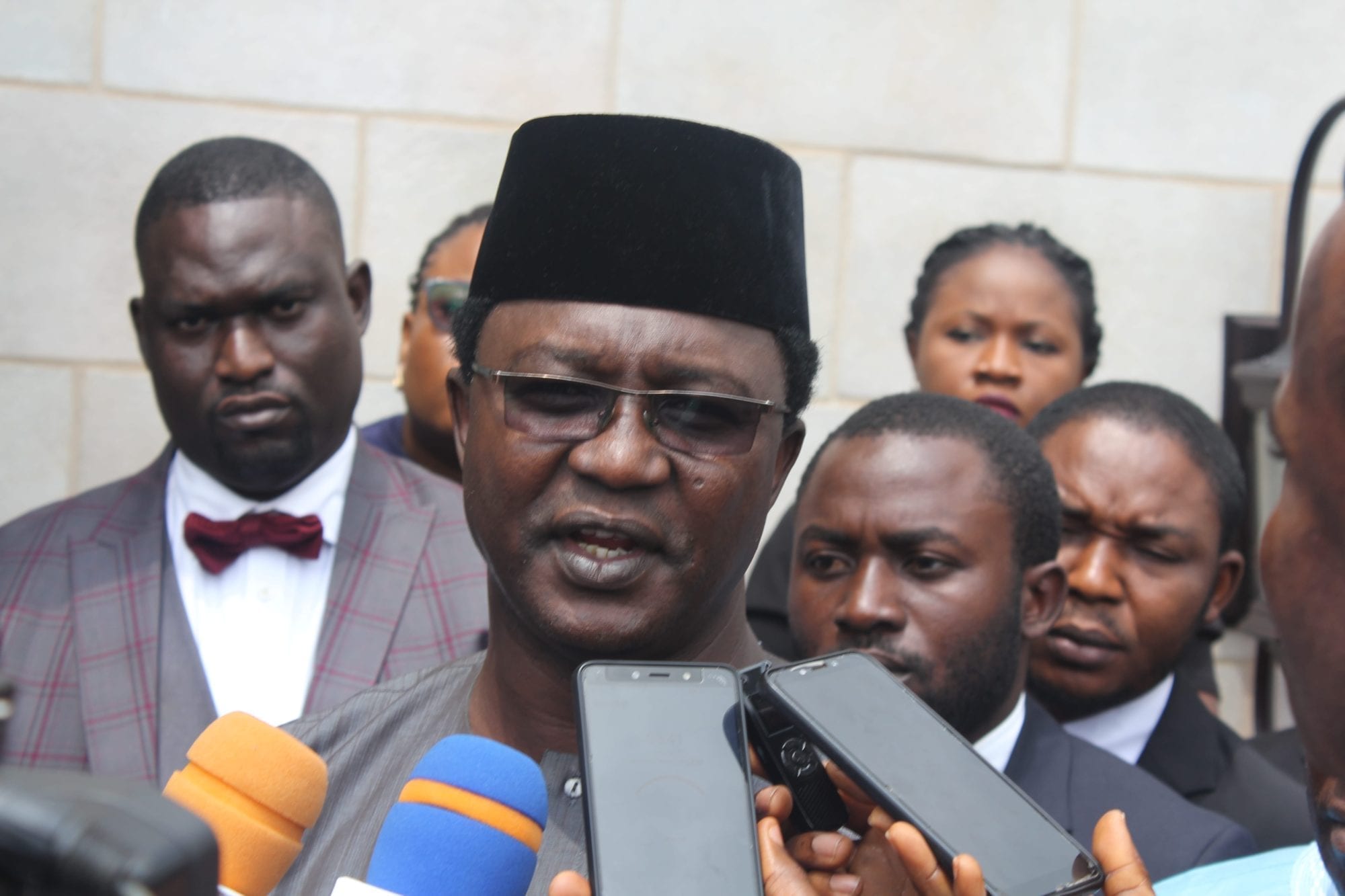
Sep 5, 2019
The Nigerian Labor Congress (NLC) hosted the founding of the Nigeria chapter of the International Lawyers Assisting Workers Network (ILAW) this week. The event was part of the nationwide union’s efforts to strengthen global ties to advance worker rights. More than 20 legal practitioners and scholars attended the event and are among ILAW’s newest members.
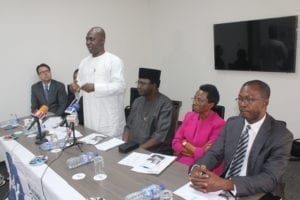
The Nigerian Labor Congress hosted the founding of the Nigeria chapter of ILAW this week. Credit: Moses Umaru, NLC
Speaking at a press conference in Abuja to announce the partnership, NLC President Ayuba Wabba said ILAW will provide an opportunity for lawyers in the country to connect directly with the International Labor Organization (ILO) and with labor lawyers around the world. “The whole essence of working in synergy is to continue to provide for the interest of workers, and defend human rights,” he said.
ILAW, a project of the Solidarity Center, now includes nearly 300 members from more than 50 countries. Launched last November, ILAW seeks to bring together legal practitioners and scholars to best represent the rights and interests of workers and their organizations and effectively advocate for workers in a global working environment. The ILAW Network is supported by an advisory board, comprised of 20 lawyers from 20 countries, with expertise on a broad range of legal matters.
In Nigeria, where jobs increasingly are contracted out and workers are forced into low-paying, insecure informal economy work, Wabba sees ILAW as another tool for strengthening the labor movement by coordinating efforts to counter the anti-worker moves by employers.
The challenges workers face in Nigeria are similar to those around the world—making collaboration of lawyers in multiple legal jurisdictions essential, says Jeff Vogt, Solidarity Center rule of law director and ILAW board chair.
“ILAW will always stand for, and protect the rights of workers and trade unions across the globe and in Nigeria,” says Vogt.
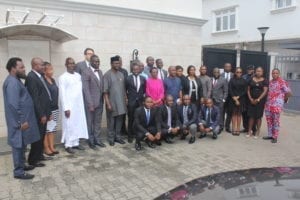
More than 20 legal practitioners and scholars took part in launching the country’s ILAW chapter. Credit: Moses Umaru, NLC
The Federal Capital Territory chapter of the Nigerian Bar Association also welcomed the partnership. “As an association of lawyers in Nigeria, we want to be part of this network,” said attorney Emmanuel Adedeyi.
In short, said Wabba, the partnership with ILAW means that “when you are in the courtroom as lawyers, we will also be on the street to compliment what you are doing in the courtroom—and that is the whole essence of us working together.”
ILAW membership includes access to legal resources and worker rights lawyers around the world. Find out more.








 the right to freedom of association,” said Bhattacharjee. “It is part of a global supply chain where the brands are the main drivers. Their purchasing practices are what causes the gender-based violence. Anything we do, they have to build held accountable in any agreement that works.”
the right to freedom of association,” said Bhattacharjee. “It is part of a global supply chain where the brands are the main drivers. Their purchasing practices are what causes the gender-based violence. Anything we do, they have to build held accountable in any agreement that works.”



